Bharat International Rice Conference (BIRC 2025) has celebrated Rice Globally. Commencing on Thursday on 30 October at Bharat Mandapam in the heart of the country, sets a milestone for the entire rice sector globally. The two-day event was organized under various institutions, such as the Agricultural and Processed Food Products Export Development Authority (APEDA), including the Ministry of Commerce and Industry. Not only this, the conference witnessed the gathering of global buyers, exporters, policymakers, and technology leaders to contemplate and reflect on the future of India’s rice trade and agricultural innovation.
Event Inaugurated By Felicitation Ceremony- The Deep Prajawalan Ceremony

A felicitation ceremony inaugurated the event, in which around 17 Indian farmers lit up the oil lamps and started the world’s biggest rice conference. In addition, it also featured the live launch of India’s first AI-based rice sorting system. The agenda of this felicitation ceremony was to acknowledge their efforts in India’s growing prominence in the global rice sector. Nearly 7,800 participants across the world attended the first day of the event.
The farmers who were felicitated at BIRC2025- Anand Malik from West Bengal, cultivator of the aromatic Govind Bhog rice, Surendra Masti from Odisha, known for Kalajeera-Koraput rice, Manjul Pratap Singh and Ajay Singh from Uttar Pradesh, cultivators of the prized Type-3 Dehradhuni Basmati, and Zafar Ahmad Bhat from Jammu and Kashmir, who preserves the legacy of the fragrant Mushkbudji variety. Not only this, but the conference also included Khangenbam Shamusaba Singh from Manipur, cultivator of the famed Chak Hao black rice; Mahan Chandra Borah from Assam, known for Joha rice; Subodh Choudhry from Bihar, who grows the traditional Katarni rice; Janardanan Karoth Veetil and Indira P from Kerala, both renowned for Kaipad rice; and Banamali Pujari and Kochu Kumar from Odisha and Kerala, respectively, for their cultivation of the Indrvariety, among others.
Informative sessions at the event
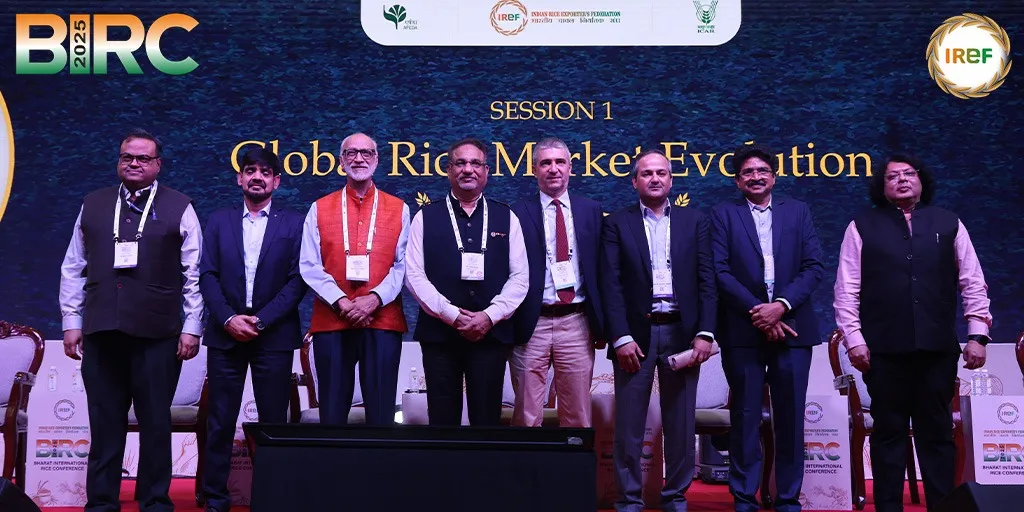
The event comprises four informative sessions that would explicitly help to reflect the state of Indian rice exports and agriculture in the global market. The First four sessions happened on 30th October 2025, in which many prominent personalities related to the field of rice and agriculture participated, making the sessions insightful for the attendees. The first session had having title Global Rice Market Evolution, in which the panelists discussed the global demand patterns, export diversifications, and the significant role played by India as a consistent rice supplier. The insightful session was moderated by moderated by Mayank Bhardwaj from Thomson Reuters, along with the panelists named Ashol Gulati from ICRIER, Prem Garg, National President of IREF, B.V Krishna Rao from TREA-K, Nitin Gupta from Olam Agri and Khalid Husai Khan from ITC, Piero Carelli from S&P Global, and Unupom Kaushik from NCEL. Not only this, but the session concluded with the launch of a major initiative to develop a vision and roadmap for the rice sector to make India Viksit Bharat by 2047, which will be implemented within the upcoming six months.

In addition, the second session, named Shipping Logistics for Rice Trade that emphasizes the challenges of freight costs, supply chain disruptions, and enhancing efficiency in export logistics. The session was moderated by Asim Anand from S&P Global, featuring experts, namely Ashwin Shanker from Chamber of George Rebello, Rizwan Sommar from DP World, Amitabh Kumar from DG Shipping, and Vikrant Agarwal from Eximwala Solutions Pte Ltd. The session particularly throws light on the aspects of freight, supply chains, and potential in export logistics.
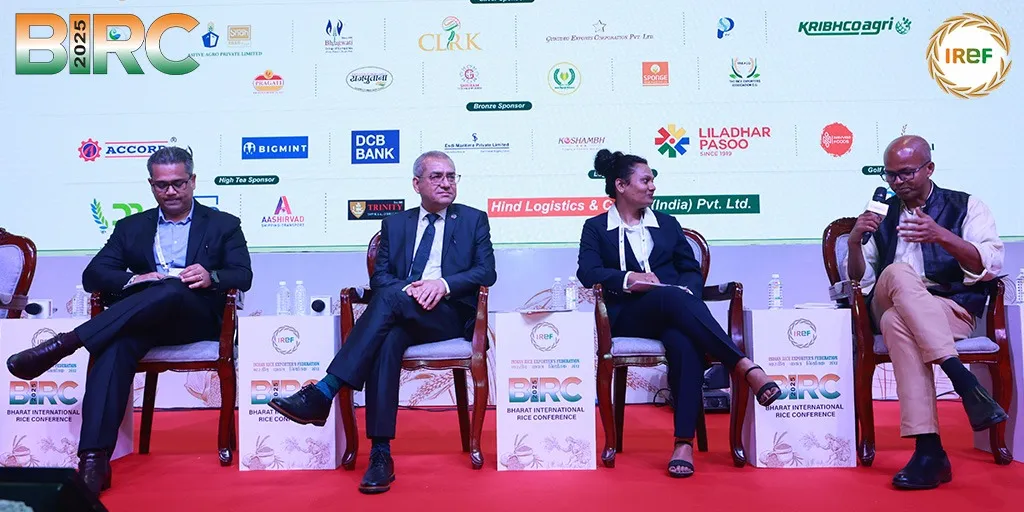
Apart from this, the third session had the title, Improving Rice Agriculture and Nutrition, which discusses climate-smart agriculture, sustainable farming practices, and nutritional fortification of rice. The wonderful session was moderated by Pratik Tarija from Bloomberg, along with panelists such as Sanjay Sethi from FAO, UN, Ankita Garg from Varaha, and Amit Vatsayan from EY. The session solely stresses the sustainable practices and nutritional value of fortified rice.
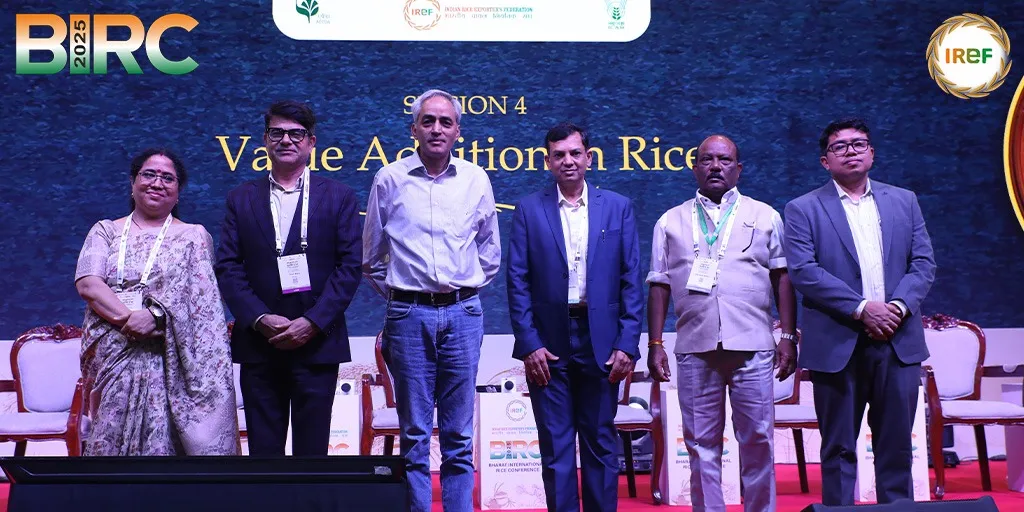
Eventually, the fourth session, named Value Addition in Rice that focused on branding, packaging, and technological upgradation as key drivers for premiumization in rice exports. This session was moderated by Hina Shukla from The Economic Times, and witnessed the participation of Tarun Bajaj from APEDA, Nese Sreenivasulu from IRRI, Arun Kumar Behera from Odisha Government, Ranjit Singh from MOFPI, Vinita Sudhanshu from APEDA and lastly Peter Salam from Maipur Agriculture Department.
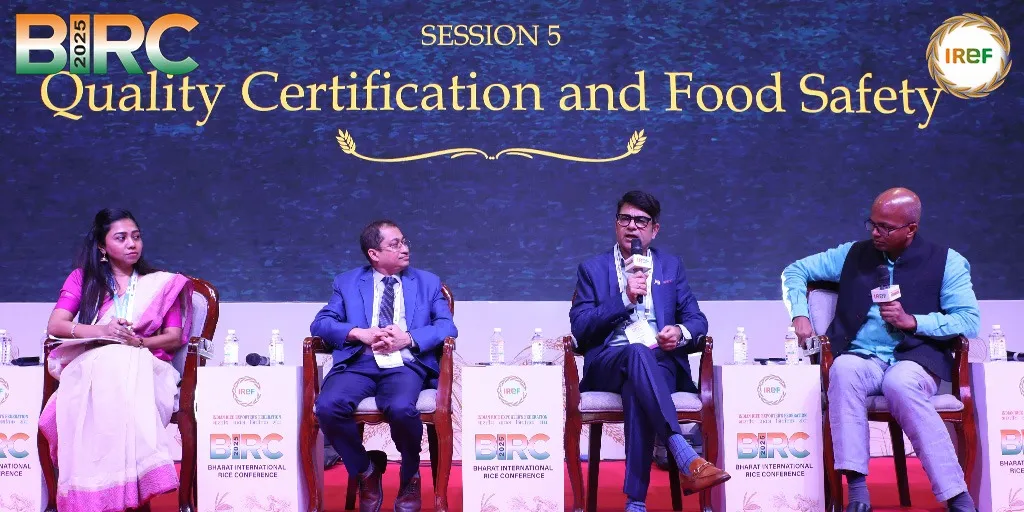
The Day 2 of the BIRC event continues with the last four sessions that again focus on rice exports, rice production, and rice agriculture. The fifth session had the title Quality Certification and Food Safety norms. Pratik Parija from Bloomberg had initiated the conversation. Whereas Mr. Soumik Mondal, from SGS, highlighted digital tags for traceable supply lines. Dr. Priyanka Sarkar, the project manager from Schemes Quality Council of India (QCI), indicated gaps in small mill setups, whereas Tarun Bajaj, Director, BEDF at APEDA, concluded the plans for farmer training on hazard analysis.
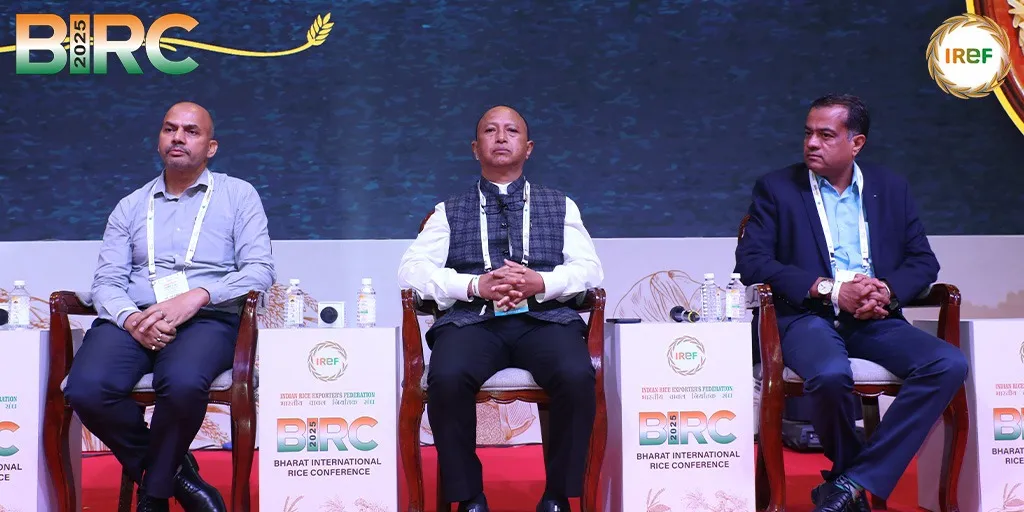
Moreover, the sixth session had having title Organic Rice and Related Goods, in which Saswati Bose, General Manager at APEDA, continued with the significance of rice. Abhishek Dev, Chairman of APEDA, noted that 30% jump in organic shipments last year. Dr Gagnesh Sharma from the National Centre for Organic and Natural Farming spoke about soil revival tricks from Punjab trials. Anil Jadhav, Regional Director at ECOCERT, focuses on certification costs for startups, and Sh Maqbool Lyngdoh Suiam, Chief Administrative Officer at MEGNOLIA, spoke on Meghalaya’s wild rice strains. Vipul Mittal, MD of NCOL, and Tapan Ray from Pratithi Organics, told the audience about the market links for hill farmers.
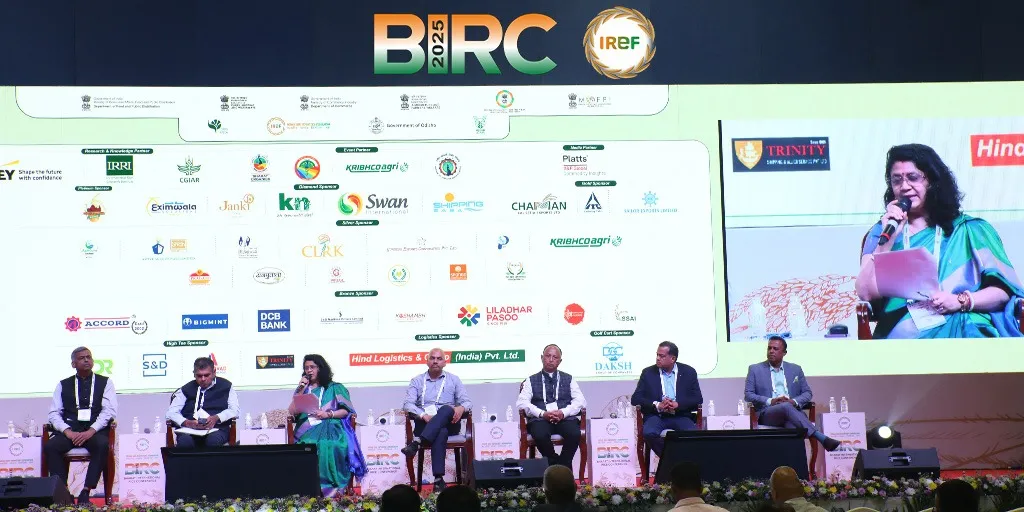
Additionally, the seventh session, titled Logistics, Credit, and Insurance, covers. The panelists throws light on the significant issues related to rice exports, such as low-interest loans for exporters hit by delays, marine risks in rough seas, and cut premium hikes for bulk deals. The session was moderated by Deepak Gandhi from Growth Drip Capital, along with the experts named Shweta Bukshet, from Rajesh Global Food and Vikram Sadiya from AgriSea Dubai, and Arpita Sen from Export Credit Guarantee Corporation of India Limited.
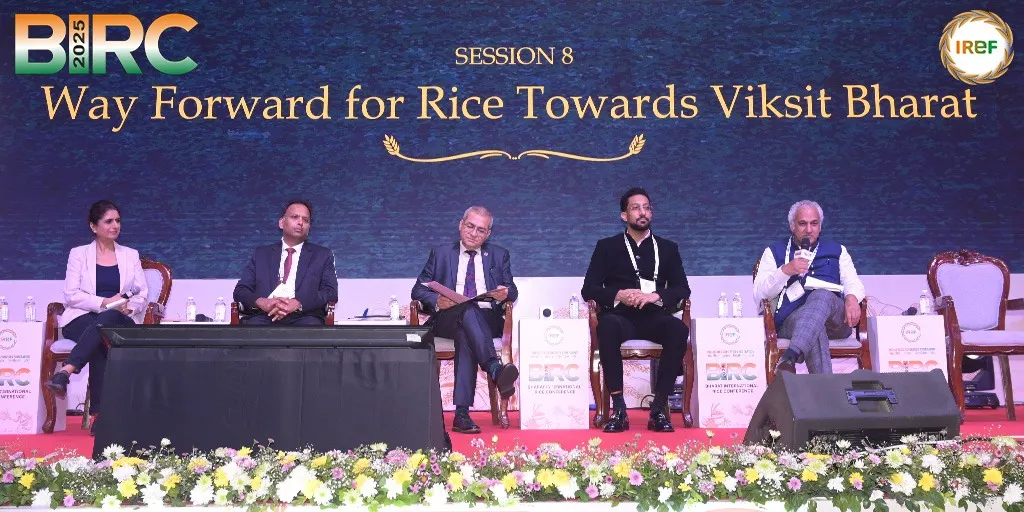
The last and most important session emphasized the role of rice in attaining Viksit Bharat 2047. One of the panelists was Dev Garg, Vice President of IREF, highlighted the significance of maintaining steady Minimum Support Prices (MSP) to ensure long-term farmer viability. Interestingly, Satyam Shivam Sundaram, partner, SAT, EY, underscored insights on the potential of carbon credits for low-water, climate-smart rice cultivation. The session ended with Sanjay Sethi from FAO UN’s discussion on connecting India’s progress in premium basmati exports with global hunger reduction and sustainable development goals.
Launch of Coffee Table Book- Akshat
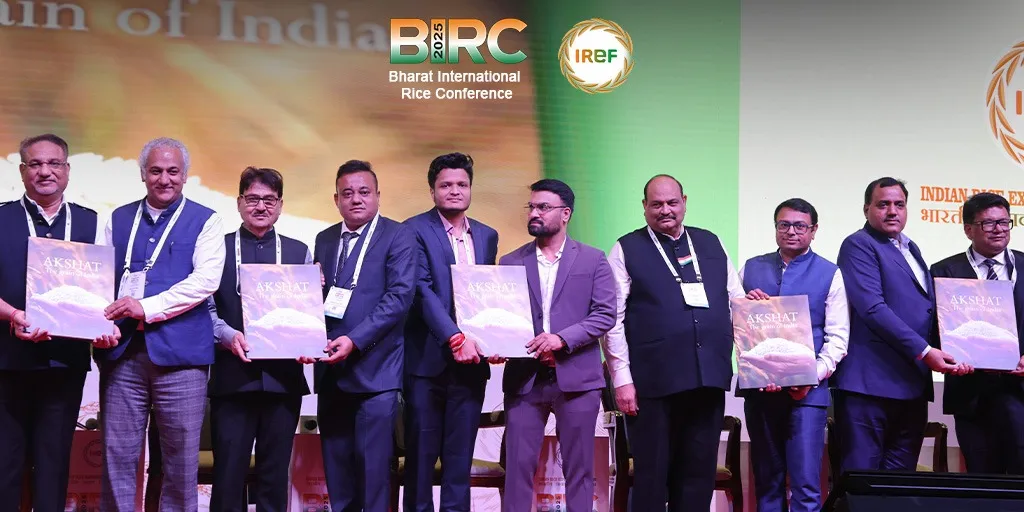
Furthermore, the event witnessed the grand launch of Akshat – The Grain of India, a coffee table book. Akshat means unbroken and pure rice grain, symbolizing prosperity, growth, and the unwavering spirit of India’s rice sector.
Titbits of global cuisines from the culinary zone
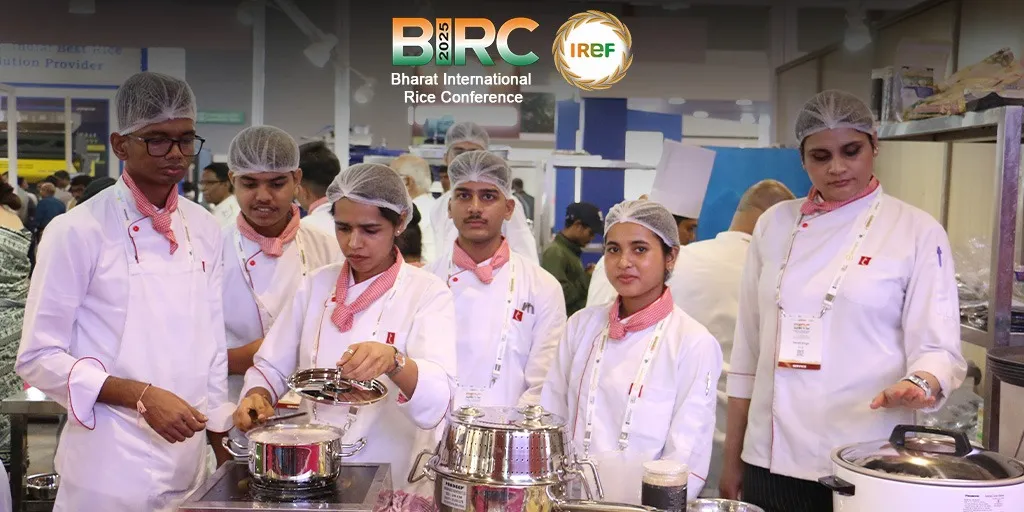
Not only this, the event showcased the titbits of global cuisines made out of Indian rice varieties with the help of ITC. Apparently, the efforts by ITC reflected how diverse Indian Rice varieties can be merged with other ingredients to prepare globally acclaimed dishes that celebrate the Indian rice varieties in a unique manner, with India’s agricultural diversity. Popular dishes like Nasi Goreng, prepared using Nagri Dubraj rice variety, and the UK’s Kedgree were prepared with Kalanamak rice. Com Chien of Vietnam was prepared with Govindbhog, and Malaysia’s Nasi Ayam prepared with the help of the Mashqbudgi rice variety.
Apart from these cuisines, Japan’s famous Sushi is prepared with Kalajeera rice along with Chicken Sticky Rice Dim Sum and Khao tai using Adamchini and Khamti rice varieties. The Middle East was also there with the dish Saudi Arabia’s Kabsa, with fragrant Wayanad Jeerakasala, whereas Mexico’s rice and cheese-stuffed Burritos made out of using Lal Dhan, which is Red rice. Besides this, Korea’s iconic Bibimap was re-innovated with delicate Chakao white rice. The efforts of ITC highlighted how India’s rice heritage is going towards innovation, sustainability, and the global promotion of Indian agriculture.
MoUs worth over 3,000 signed
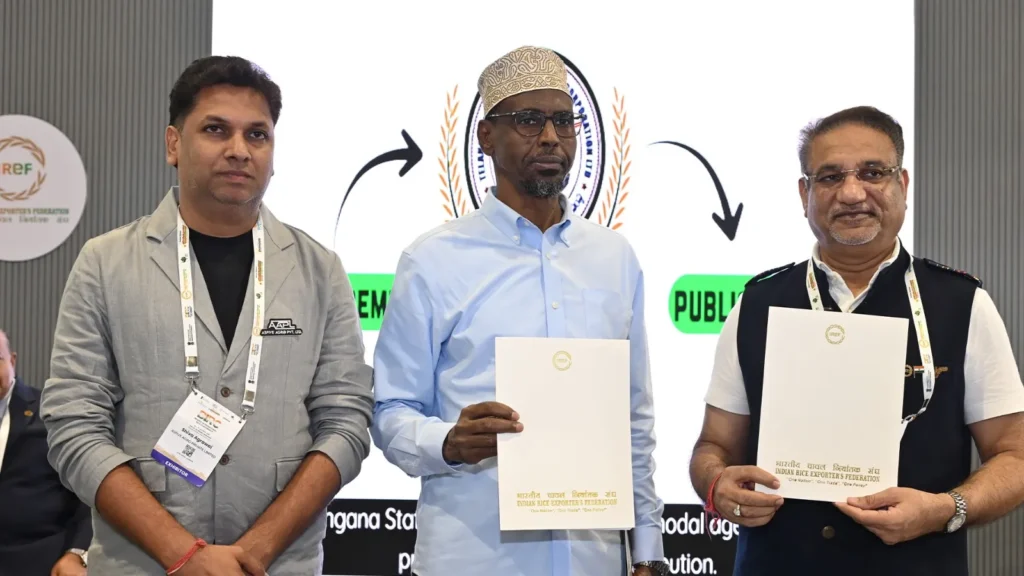
One of the important highlights of the event was the MoUs worth over Rs. 3000 crore signed on the first day of the event. In these MoUs, the government solely facilitated agreements worth over Rs. 2,200 crore with private companies in Bihar for GI varieties of rice such as Katarni rice. Moreover, other MoUs were signed among Indian rice companies and their Indian and foreign counterparts.
The event concluded with the Gala dinner and awards ceremony, in which top exporters and innovative startups were awarded for their work, like sustainable packaging and digital sales.



